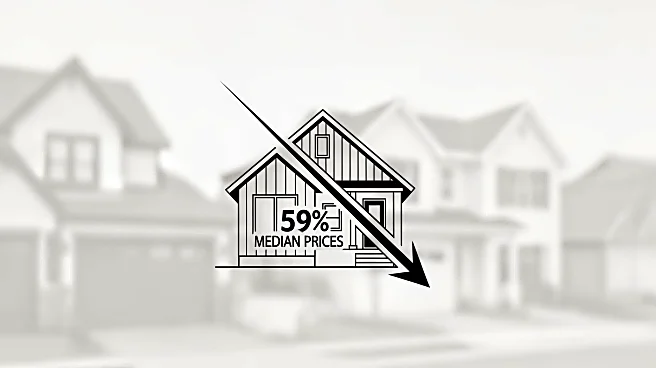What's Happening?
Recent data from Realtor.com indicates a decrease in the median home sale prices in Washington County, Utah, for July. The median price fell to $492,968, marking a 1.3% decline from June's median of $499,488.
Despite this monthly drop, the median price is still 3.6% higher than July 2024's figure of $476,019. Single-family homes saw a slight increase in median selling price to $556,250, up 1.1% from June, but down from $561,250 in July 2024. Condominiums and townhomes experienced a 4.4% rise in median sales price to $384,375 from June's $368,044, and an 8.5% increase compared to July 2024. The total number of recorded sales in Washington County rose by 11.3% from July 2024, totaling 443 transactions.
Why It's Important?
The fluctuation in home prices in Washington County reflects broader trends in the real estate market, impacting both buyers and sellers. Lower median prices may attract more buyers, potentially increasing demand and competition. However, sellers might face challenges in achieving desired sale prices, affecting their financial planning. The increase in sales volume suggests a dynamic market, possibly influenced by economic factors such as interest rates and local economic conditions. The rise in condominium and townhome prices indicates a shift in buyer preferences or availability, which could influence future development and investment in these types of properties.
What's Next?
As the real estate market continues to evolve, stakeholders such as real estate agents, developers, and local government may need to adjust strategies to accommodate changing buyer preferences and economic conditions. Monitoring interest rates and economic indicators will be crucial for predicting future market trends. Additionally, the increase in sales volume could lead to more competitive pricing strategies among sellers, while buyers may need to act quickly to secure favorable deals. The local government might consider policies to support affordable housing initiatives in response to these market dynamics.
Beyond the Headlines
The data highlights potential shifts in housing preferences, with increased interest in condominiums and townhomes. This trend could lead to changes in urban planning and development, emphasizing multi-family housing projects. Additionally, the real estate market's performance can have ripple effects on local businesses and services, influencing economic growth and community development. Understanding these deeper implications can help stakeholders make informed decisions that align with long-term community goals.









